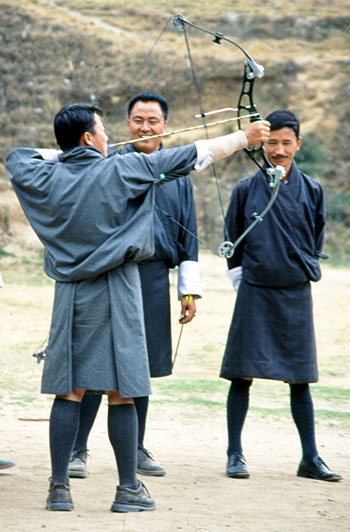Dancing about and shouting sexual insults at the
opposing team, Bhutanese sports fans enjoy their favorite pastime, which
is, of all things, archery!
Archery? It may seem counterintuitive for a devoutly Buddhist nation
to choose a sport like archery as its favorite pastime since Buddhists
have a profound reverence for all living things, and participating in
a sport where the equipment is primarily designed for hunting or warfare
seems a bit out of place. However, judging by the fact that nearly all
villages in the Kingdom of Bhutan have an archery range, passion for
the sport is not to be taken lightly.
Popularity of the sport can be traced all the way back to a 15th century
legend. During this time, it is believed Lama Drukpa Kuenley, known affectionately
as the “divine madman,” shot an arrow from Nangkartse in
Tibet. Following the path of the arrow led him to Bhutan, land of the
thunder dragon. Archery symbolism is present in Buddhist beliefs and
often represents the offering of prayers.
The city was built entirely of adobe, a local material perfectly suited
for the environment—it collects heat during the day and slowly
releases it at night. The adobe walls reached as high as 33 feet and
provided privacy while guarding against dust, sand and high winds.
Today the matches are a festival of brightly-costumed archers and spectators
alike. In fact, the activity is centered as much around the pageantry
of the festival as it is around the competition of hitting the bulls-eye.
Archers go to great lengths to distract or demoralize their opponents—even
going so far as to dance in front of the other&s target! This behavior
is not just limited to the archers—the women in the crowd act as
cheerleaders, shouting raucous and degrading comments about the other
team’s heritage and sexual prowess. All of the hullabaloo is in
jest and no one is ruffled by it or takes much offense.
Wielding the traditional hand-carved bamboo bow (nowadays some use state-of-the-art
compound bows), participants compete in teams of 15 players. Two points
are given if the arrow hits any part of the target, three points for
a bulls-eye, and if the arrow sticks in the ground within one arrow’s
distance of the target, the team earns one point. The first team to score
25 points is declared the winner. To play, the archers are each given
two shots during their turn. The field is set up like a horseshoe pitch,
so team members shuttle between the targets in between shots. Not only
is hitting the target difficult, but the walking back and forth across
the pitch can be tiresome as well, because the small wooden targets are
placed 140 meters apart! That’s nearly three times the distance
of Olympic standards (a mere 50 meters) and probably why archers take
the risk of taunting their rivals while standing in front of the target.
The rival discouragement is a large part of the spectacle.
Archery is the only Olympic sport in which Bhutanese athletes compete.
The Bhutanese have been involved in the games since 1984 and in the 2004
Olympics they made it to the second qualifying round. They remain hopeful
that Olympic gold is in their future. For now, as in the past, the bowmen
from Bhutan continue to play for the love of the sport and the next chance
to poke fun at their friends.
Click Here for information on our Bhutan Tours.


 By
Jason Hall
By
Jason Hall
